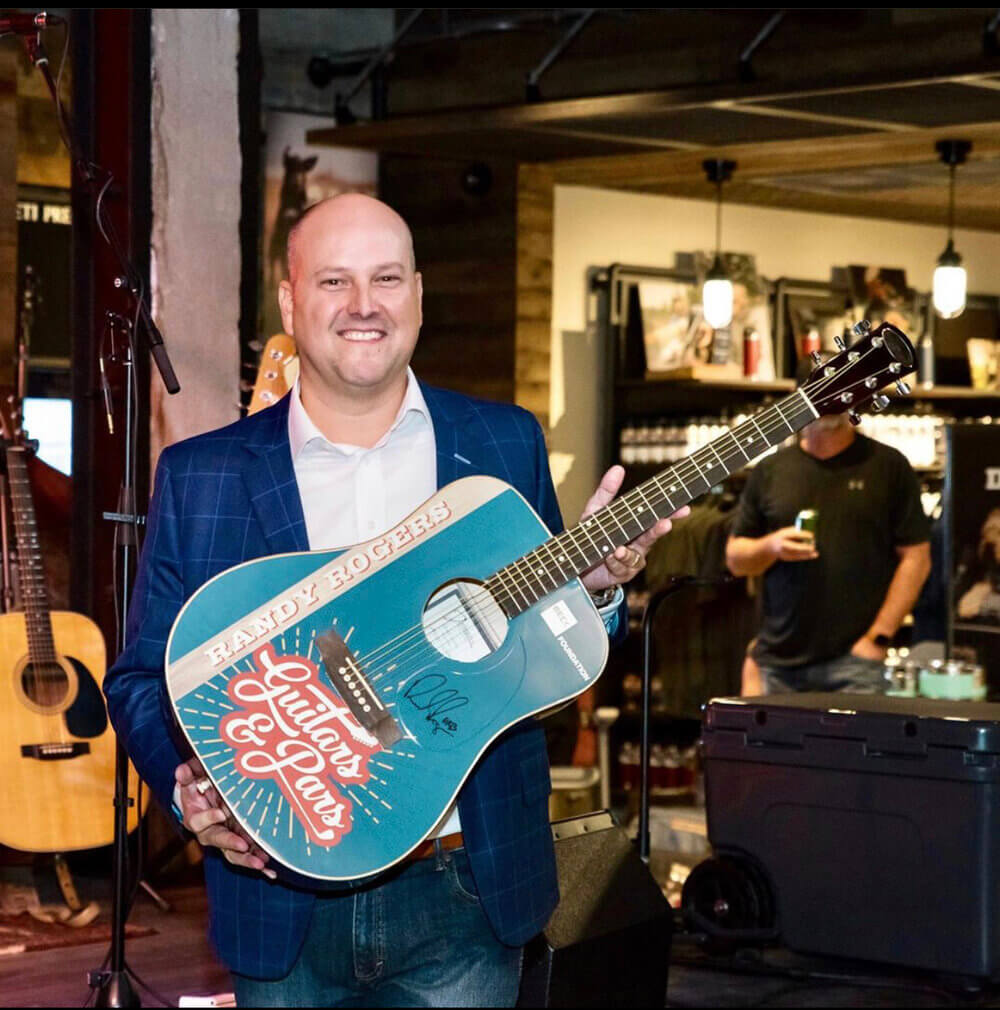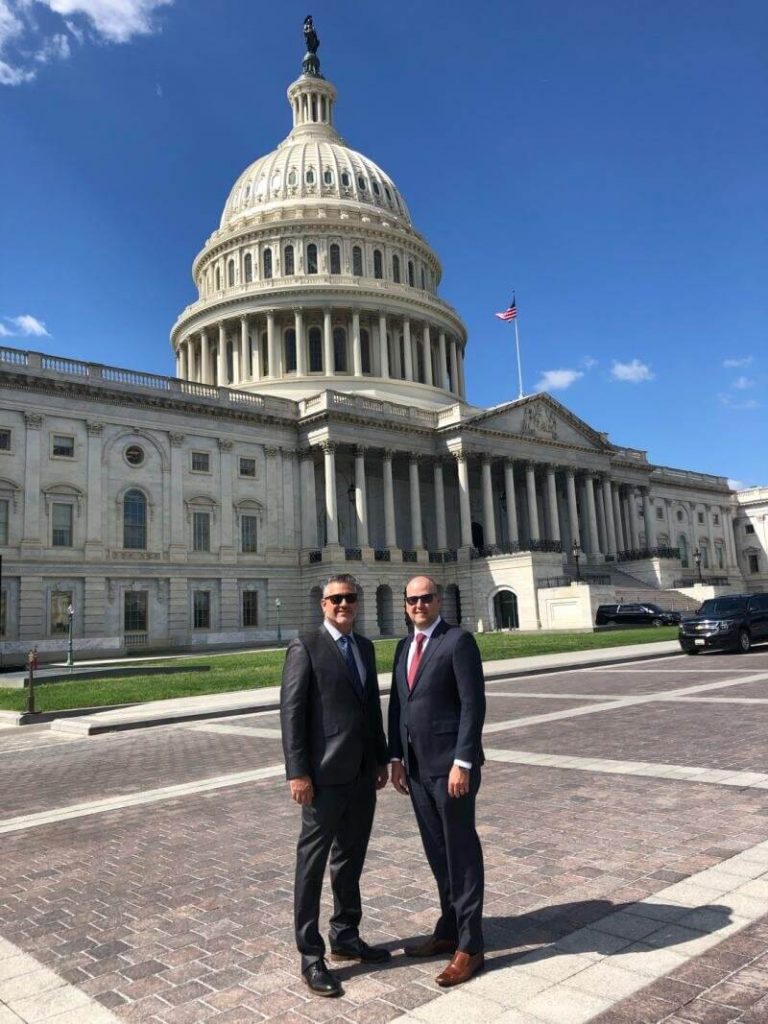“You’ve got to have that relationship before you get that opportunity.”
Rarely do most of us take time to reflect on our careers, what it took to get here and where we’re headed. As part of an ongoing series we’re interviewing professionals in the construction and oil & gas industries to share their stories and wisdom for younger professionals to consider as they forge their own careers. For this inaugural article we’re excited to have Ryan Therrell, director of business development at the beck group and former chairman of the Austin chapter associated general contractors (AGC).
JCDP:
How did you get your start in the industry?
Therrell:
I was born and raised here in Austin and went to Texas A&M for college. I was a wildlife and fisheries science major initially. When I graduated from high school, I thought I was going to be in some kind of wildlife management position at this point in my career. But as I got into it I figured out I was going to have to get a PhD, and I didn’t want to do eight more years of school. I had a friend that was in the construction science school and he said “Hey, come with me to a class one day” and I decided I’d take one of the classes the next semester and got 100 on the test where I was getting 40s on the zoology and biology tests and I thought “Man, I can do this”. I like building, and I was fairly handy growing up. So I figured I could get into it and see where it took me. And so I thought I was going to be a homebuilder. Actually, I interned for a couple of years with a custom home builder here in Austin. They were great and had an opportunity to get into commercial construction. I worked for The Beck Group just as they were opening their office in Austin.
That was in January of 2000. So it’s been a little over 20 years and back then I really didn’t know much. I thought I knew, but that’s the thing about construction, experience is really where your degree comes in. You graduate with a degree, but you really make your degree through experience on the job. Working with guys, making mistakes and working through them, that’s when you learn what it’s like to be in construction. A lot of problem solving, a lot of relationship building and being able to utilize your relationships in order to get what you need done.
This business isn’t easy and it requires a lot of interaction and a lot of communication, a lot of humility when you screw up, and a lot of drive and determination to get through things. That stuff you don’t get in a book, and while I understood the theories and could do the math equations that I needed to do that wasn’t where I learned that. Especially for me, I was on a commercial construction site and I didn’t know anything. I needed to rely on the guys that came ahead of me to mentor me and put me in the positions to sink or swim. And I had a lot of really good people ahead of me that allowed me to do as much as I could. But I didn’t get into too bad of a position whenever things weren’t going where I hoped they would.
JCDP:
What was one of your first positions after college?
Therrell:
My first position was called Office Engineer Trainee (OET). We don’t even have that anymore. But basically it was a six month probationary title for college graduates.
Today graduates coming out of school decide either to go in the field or in the office. Back then you came into Beck and you went into the estimating department and you learned how to be an estimator for six months. Then you got to go into an office or field position. So when we were coming out, you got to take office or field. And if you went in the office, you were an office engineer trainee. If you were in the field, you were a field engineer trainee.
And you’re just trying to learn, there’s a ton of processes, things that you’ve got to learn, like how to write a bid package. We might have learned what a bid package was, but we don’t really understand what it meant to put that together, how to put all the exhibits together in a contract? How do you estimate? How to buy a trade out and get people to go out to the job site when you need them? How to put a schedule together? All that kind of stuff just comes with time and being in the role.
As an OET you’re just trying to learn what it means to read a complex set of drawings and how to do a request for information (RFI) and what goes with an RFI and the cost implications and change orders, all that kind of stuff. And then you move up. And basically it’s about your skill level and how well you can manage projects. And within project management comes a lot of things, financials and even more new processes.
Things that you’ve got to work through and that just comes with time and more projects.
JCDP:
Did you have to do any additional education moving further into project management?
Therrell:
Well, at Beck we had a pretty robust yearly training requirement, and still do. You get graded on it and it’s part of your overall compensation. We were required to get 40 hours of training but in addition to that, we also had a lot of core skills training that was happening just within our region. Someone would be responsible for putting together a training session once a month over something specific, like writing the electrical scope for a contract or certain things about the plumbing trade or mechanical or what may be a various kind of core skills, things that you needed to know just to get a baseline foundation for what your role is. A lot of concrete and rebar and how to read shop drawings, how to know what you’re buying, etc. So it was a mix. Specific trainings and the guys I worked with, project managers above me and superintendents, plus I’d get third party training, and still do. You’ve got to keep learning.
JCDP:
Were there any particular challenge(s) starting out that presented a steeper learning curve than you had anticipated?
Therrell:
Actually, two examples.
When I was first getting started our company was working with Southwestern Bell, now AT&T, to roll out high speed Internet, and the FCC had placed requirements on Southwestern Bell to get high-speed internet throughout the cities and the states. So I went onto this AT&T account and got thrown fifteen jobs of varying size. Not overly big, but had to get the high-speed internet out and that meant distributing these little huts and pieces of equipment for the phone network and you’re up against the timeline, and the FCC had penalties for AT&T, all these kinds of things. And so it’s a lot about how to manage your time, how to be efficient, how to be productive, how to be driven, to get results and move on those things.
When it comes to construction, you’ve got to be disciplined, you’ve got to be organized. You’ve got to have really good time management skills. And you have to be persuasive to get people to do things that you need them to do, even when there might be some challenges.
I can remember a second example a couple of years later, when I was put in a role of being project manager for a bigger project and it was an overbill of an AT&T facility. I was young and I was working with a lot of guys that were much older than me. Trying to earn the respect of guys 20 years older than me was something I struggled with. I didn’t care about people’s age, I just cared about what they could do. When guys would tell me things like “I’ve been doing this my whole life and this is how I’m going to do it”, that answer didn’t work for me. I had some specific instances of just trying to get stuff done and got looks thrown in my face, or “this is how we do it, son”. I’d always be looking for the people that wanted to work together and wanted to be collaborative and not to take advantage, but to know we had each other’s backs. We get stuff done and everybody can make money and move on. It was a real challenge for all of them, especially for young guys coming out.
This industry is very similar to the military, in the way that you have to earn your stripes, you’ve got to earn your respect. You don’t just get it, you earn it through showing you’re capable of having the time under your belt, knowing what you’re doing, knowing what you’re talking about. And so many people, they know what they’re doing because they’ve been here 10 years longer and you can get exposed pretty quickly if you don’t know what you’re doing.
JCDP:
Are there any particular interpersonal skills that you found to be most beneficial for earning that respect and building effective partnerships?
Therrell:
Sure. I really like creating relationships with people. And so when I was a project manager, I had really strong relationships with my subcontractors and valued those relationships. I put time into them. I feel like they were my friends in addition to being a business relationship. And I think that yields a better outcome both in productivity and when stuff doesn’t go the way you want it to.
So when I’m in trouble and I need help, I can go to those guys. If they’re in trouble, they can come to me and we can work things out. That only happens through really strong relationships. And so you gotta be good at talking to people, getting to know them, understanding them and working together, and not just be a jerk. There’s enough of those guys in this business that are just Type-A, hardcore, no-B.S. guys. And I’m type-A, I just have a different style when it comes to dealing with people. And I have high expectations, driven, but I’m also able to build relationships with people, which I think ultimately is a huge differentiator when it comes later in their career.
Especially in this business, there’s a lot of people in it, but it’s pretty small. You start to create good relationships and you will grow. The people you make relationships with will grow and all those guys will be there 20 years or more and you’ll be running the show with them. And that’s important in my role as business development, when I first got into the role, I looked at the guys that were in positions of power within the industry in Austin and I mapped them all out and said “Who are the people that I look up to? What are the companies? What’s special about them?” And then I looked back and there were guys that had worked together for 20 years that were dominating it.
There were a handful of these folks that were out there, these architects and contractors that had worked together for literally two decades or more. And that consistency, I think, is what helped propel them to the top. They have really strong relationships and I wanted to see that happen with me. I don’t think I’m even at the top yet. I think I’m close, but I’m 20 years in. To look back and see where I was then and where I am now, the relationships, the guys that I’ve been in the trenches with fighting to build our businesses and dealing with everything that we dealt with, it’s pretty cool.

“I’m also able to build relationships with people, which I think ultimately is a huge differentiator”
JCDP:
Yeah, definitely stronger together to have that network to contribute toward and be able to rely upon as well.
Therrell:
That’s right. I see that in a lot of our younger folks who like the collaboration.
Community and networking is maybe a little bit different than it was when I was coming out. Not that it wasn’t there, it certainly was, but it’s different. With this generation that’s behind me and maybe even more different with the generation that’s coming out of school right now. There’s an expectation to collaborate in the community and how you communicate. It’s just a lot different.
It was much more hierarchical when I was coming out versus now it feels more flat. You’ve got access to different people now more than I did coming out of school.
JCDP:
Sounds like you would argue for the better.
Therrell:
Oh, yeah. I think so, for the better. It’s interesting because there’s three generations in construction right now. There’s the guys that are ahead of me that are, and I don’t mean this in a bad way, but they’re stuck in their way, the way they always did it. There was somebody that was even harder on them, ahead of them. And then there’s my generation, which, we’re stuck in between those guys and the millennials, guys that are changing everything and it’s got to be done in a different way. There’s a big gap between the generation that’s aging out right now and the generation that’s coming in.
It’s interesting to see this in the way that you communicate with people. I mean, if you would’ve said in 2000, hey, we want to have a wellness committee that’s focused on whole-body health. You’d have gotten looked at sideways, and now that’s expected.
JCDP:
So that touches on one of the things I wanted to ask, how do you see the industry changing? And what are you doing to prepare for it? And I think that’s a great example, how culturally things are changing.
Therrell:
Yeah, I know it varies widely. You can’t just lump and say in construction everyone’s doing this. However, what I see from my company and a lot of our peer companies is it mirrors more of a corporate mindset, like you might see in the tech industry where there is a focus on work-life balance. It’s not really work-life balance, it’s just whole-life balance.
There’s an expectation that you’re going to get something out of what you do when you’re working. When I came in, we were just happy to have a job. And you just showed up because you wanted to have a job. Now, people will move. I’ve been with Beck for 20 years, most people’s mouths drop when they hear that. Back when I was coming out of school, the reason I went to Beck was because everybody I interviewed with had at least 20 years of experience here. And that’s just not the case now. So I think we as an employer have to adapt in order to be able to retain talent.
Ryan Therrell Beck Texas Construction
And I think we’re doing a pretty good job of that. We have a program called Vitality that we participate in and one of the things that is in there is an Apple Watch. So if you want to track your workouts and if you meet a certain set of workouts per week, then that goes toward credits and you get your Apple Watch paid for by working out. And the theory behind all of this is that as a business, we also have insurance costs, too. And if we have healthy employees, we have lower insurance costs.
So that’s just one of those things where we have to ask “How do we look at this?”. Do we just take a traditional approach and say here’s X amount for insurance and X for employee bonuses and salaries, etc? But we’ve taken a holistic approach, and a lot of the corporate industry now is taking a look at the whole employee and whole body health and how health has an impact on your insurance costs and other parts of your business.
And the work environment is important, too. I mean, we office downtown and we were an early adopter to an open office. Even now, though, I feel like we’ve got to change our office so that we can continue to be competitive. How does an office feel when you go in and that place is where you’re going to be spending a lot of your time, a majority of your time? So that’s something else that’s different.
JCDP:
Absolutely. Are there any other major shifts in the industry that you’ve noticed whether abroad or even right in Austin?
Therrell:
Sure. I mean, women and diversity are both big shifts. And they’re a big part of what the industry is now today. And I’ll give you an example. I recently completed two years as the Chairman of the Associated General Contractors (AGC) and we’re going through a process of upgrading our office and we’ve got a seventy-fifth anniversary coming up next year, and we really wanted to be more reflective of the overall industry. There’s considerably more women and there’s considerably more minorities. And those two help create a different mindset in the way you operate your business, the way business is getting done. And it’s been really cool to see even the AGC put some practices into place in our company too. I mean, we have women on our C-suite. We have a Bahamian CEO. We’ve got a lot going on in that demographic shift, if you will.
JCDP:
What kind of advice would you give your younger self?
Therrell:
Learn everything you can and be patient. Push yourself. I did those, but I don’t think I was patient enough.
You’ve got to earn your stripes a little bit here. And I think in the beginning of my career, I had a little bit of an I-know-everything-cavalier attitude, and parts of that that are good, but if you choose this as a career, then you need to be patient to let the career happen. And I guess what I see in myself and some of our younger guys is that there’s a thought that I’m not promoted fast enough, or as fast as my buddy who’s in tech, and trying to apply things that are happening in other industries to ours doesn’t work. Our industry is unique and time means everything. You just have to put in a bunch of time in order to learn the stuff that you need to learn so you can get to the real top of your game in your career. It doesn’t just happen. I’m not at the top of my game yet and I’m 20 years in.
I can see it differently now. Back when I was coming out, it’s like all I could see was just frustration. And some people that we work with, it’s the same for them, and that’s not really how it works. And some of those guys get frustrated and they go to a company that says, “okay, you’ll be a project manager” and they may or may not be a project manager, right? I mean, we can all be called project managers but what you can actually do when managing millions and millions of dollars. It just takes time to learn how to do it. I got impatient in my career and I left for a while, but that helped me see that you just need experience. You need to push yourself. You need to learn everything you can. You take every opportunity when it comes to you. And you need to find mentors and guides that you can look up to that will help you learn and help you get places.
I mean, I’ve had a bunch of mentors and those guys helped shape my career in ways that I never would have thought about. When you’re 7 – 10 years in just know that it gets better. That’s when I struggled the most and I’ve seen a bunch of our guys, I mean, they’ve gone through it. It’s like you’re 30 and you’re going, what am I gonna do with my life? But it gets better. Not everybody is a millionaire right when they graduate. There’s a little bit of thinking that, as soon as I get out into the world world, I’ll make a whole bunch of money, I’ll be really cool. It doesn’t happen that often, it takes a lot of hard work and you just have to stick with it.
JCDP:
You mentioned the importance of having mentors, even for soft skills and encouraging you to keep going. Do you have any advice on how to build those relationships?
Therrell:
I have mentors and they mentor differently, each of them in their own way, and they’re not necessarily in my industry either. I have a mentor that has founded a bunch of different companies in his lifetime and from him I learned how to do marketing, how to do sales, how to start a business, what’s important in a business, those kinds of things. And I had another mentor that was just a people person. He helped me create relationships. And I have another mentor that is inside our business who is pushing me personally and holding me accountable.
I meet these guys regularly. Some of them have a formal, “Here are the things I’m working on” process, like the one inside my company. He’s one of the main partners in our company. We have our pleasantries and then he’s like, “what did you do? You told me last time we talked you were going to do this. Did you do it?” You have to sit there and go, “Yeah, I did do it” or “no, I didn’t do it”. And it took me a couple of times when we first got into this formal mentoring where I knew that he was going to hold me accountable and he cares whether I do this stuff or not, but it’s ultimately up to me. So he would just sit there and ask the simple questions. “Did you do what you said you were going to do? No? Why? What are you going to do? Are you going to do it the next time?” I mean, those are simple questions. But when you talk about here are my goals and here are the things that I’m working on, on myself you can let those things go to the back of your priority list if you don’t have somebody there to keep you honest with yourself and you can miss out on a lot of stuff. I think having a bunch of folks that you can learn from helps out a lot. It comes with time and experience and meeting people and sometimes you can say, hey, would you help me do this?
JCDP:
So sometimes that was a deliberate ask?
Therrell:
Yeah. There were a couple of them where it was very deliberate. We would talk every other week at a certain time, and in that time we were getting to know each other better, deepening our relationship, understanding what’s happening on a weekly basis within his life and mine. And then he would ask “What are your goals for the year? What are you working on right now? What are you reading? What are you doing to prepare yourself for the next position?”, those kinds of things. I mean, he was really pushing me on them. And we need that. It’s just like a coach in sports. You don’t just get to be a star athlete by yourself. You have to work and you have to have somebody working on you to do that. The same is true in business. If you talk to a lot of business owners and successful business people, they would tell you they have coaches.

Ryan Therrell & Alan Codinain Washington DC to voice support for workforce development and other industry issues.
Linkedin




